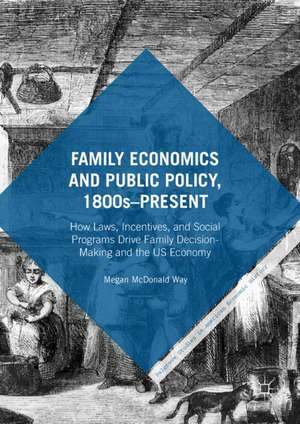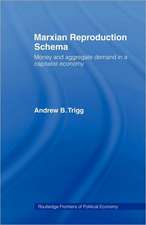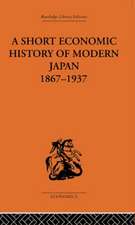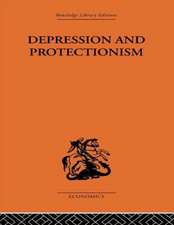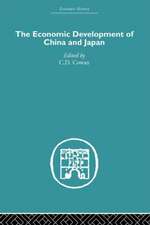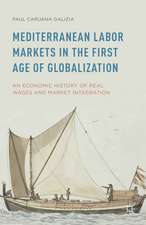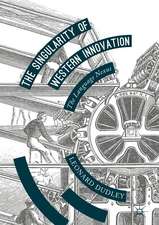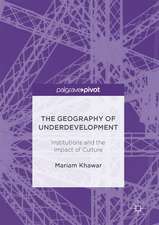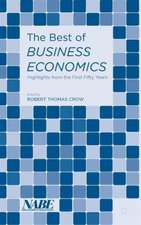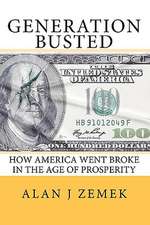Family Economics and Public Policy, 1800s–Present: How Laws, Incentives, and Social Programs Drive Family Decision-Making and the US Economy: Palgrave Studies in American Economic History
Autor Megan McDonald Wayen Limba Engleză Hardback – 30 aug 2018
| Toate formatele și edițiile | Preț | Express |
|---|---|---|
| Paperback (1) | 526.83 lei 6-8 săpt. | |
| Palgrave Macmillan US – 10 dec 2019 | 526.83 lei 6-8 săpt. | |
| Hardback (1) | 701.59 lei 6-8 săpt. | |
| Palgrave Macmillan US – 30 aug 2018 | 701.59 lei 6-8 săpt. |
Preț: 701.59 lei
Preț vechi: 825.39 lei
-15% Nou
Puncte Express: 1052
Preț estimativ în valută:
134.25€ • 143.56$ • 111.93£
134.25€ • 143.56$ • 111.93£
Carte tipărită la comandă
Livrare economică 17 aprilie-01 mai
Preluare comenzi: 021 569.72.76
Specificații
ISBN-13: 9781137439611
ISBN-10: 1137439610
Pagini: 268
Ilustrații: XIX, 315 p. 26 illus.
Dimensiuni: 148 x 210 mm
Greutate: 0.55 kg
Ediția:1st ed. 2018
Editura: Palgrave Macmillan US
Colecția Palgrave Macmillan
Seria Palgrave Studies in American Economic History
Locul publicării:New York, United States
ISBN-10: 1137439610
Pagini: 268
Ilustrații: XIX, 315 p. 26 illus.
Dimensiuni: 148 x 210 mm
Greutate: 0.55 kg
Ediția:1st ed. 2018
Editura: Palgrave Macmillan US
Colecția Palgrave Macmillan
Seria Palgrave Studies in American Economic History
Locul publicării:New York, United States
Cuprins
1. Introduction: Public Policy and Family Economics in US History.- 2. Families: Economic Functions and Decision-Making.- 3. The Path of US Fertility: Micro Decisions with Macro Consequences.- 4. Private and Public Investments in Children: Creating the Human Capital to Meet US Economic Needs.- 5. Labor Force Participation and Home Production: Evolving Rights, Roles, and Opportunities for Women and Men .- 6. The Economics of Changing Family Structures: The Public Interest in Marriage and Family Formation.- 7. Intergenerational Economics: Public and Family Support for Retirees in US History and Looking Forward.- 8. Family Economics, Public Policy, and Inequality: Diverging Family Fortunes and the Risk to the US Economy.
Notă biografică
Megan McDonald Way is Associate Professor and Chair of the Economics Division at Babson College, USA. She teaches graduate and undergraduate microeconomics principles and undergraduate labor courses. Her research focuses on intergenerational financial transfers within families, specifically how demographic changes in family structure are affecting the way money gets passed between the generations. She also studies gender earnings gaps, particularly among the self-employed. Prior to her career in academia, Dr. Way spent eight years as a marketing professional in the software industry.
Textul de pe ultima copertă
This book explores family economic decision-making in the United States from the nineteenth century through present day, specifically looking at the relationship between family resource allocation decisions and government policy. It examines how families have responded to incentives and constraints established by diverse federal and state policies and laws, including the regulation of marriage and of female labor force participation, child labor and education policies—including segregation—social welfare programs, and more. The goal of this book is to present family economic decisions throughout US history in a way that contextualizes where the US economy and the families that drive it have been. It goes on to discuss the role public policies have played in that journey, where we need to go from here, and how public policies can help us get there. At a time when American families are more complex than ever before, this volume will educate readers on the often unrecognized role that government policies have on our family lives, and the uncelebrated role that family economic decision-making has on the future of the US economy.
Caracteristici
Highlights how the interplay of public policy and family economic decision-making have driven innovation and prosperity within the US economy Examines the historical and present-day policies that have purposely or inadvertently advantaged some families over others, leading to persistent inequalities Explores different ways in which policy can help people achieve their productive potential as the US economy moves into the mid-twenty-first century and faces new challenges Tracks dramatic changes in the American family and the evolution of the US economy from the 1800s–present
